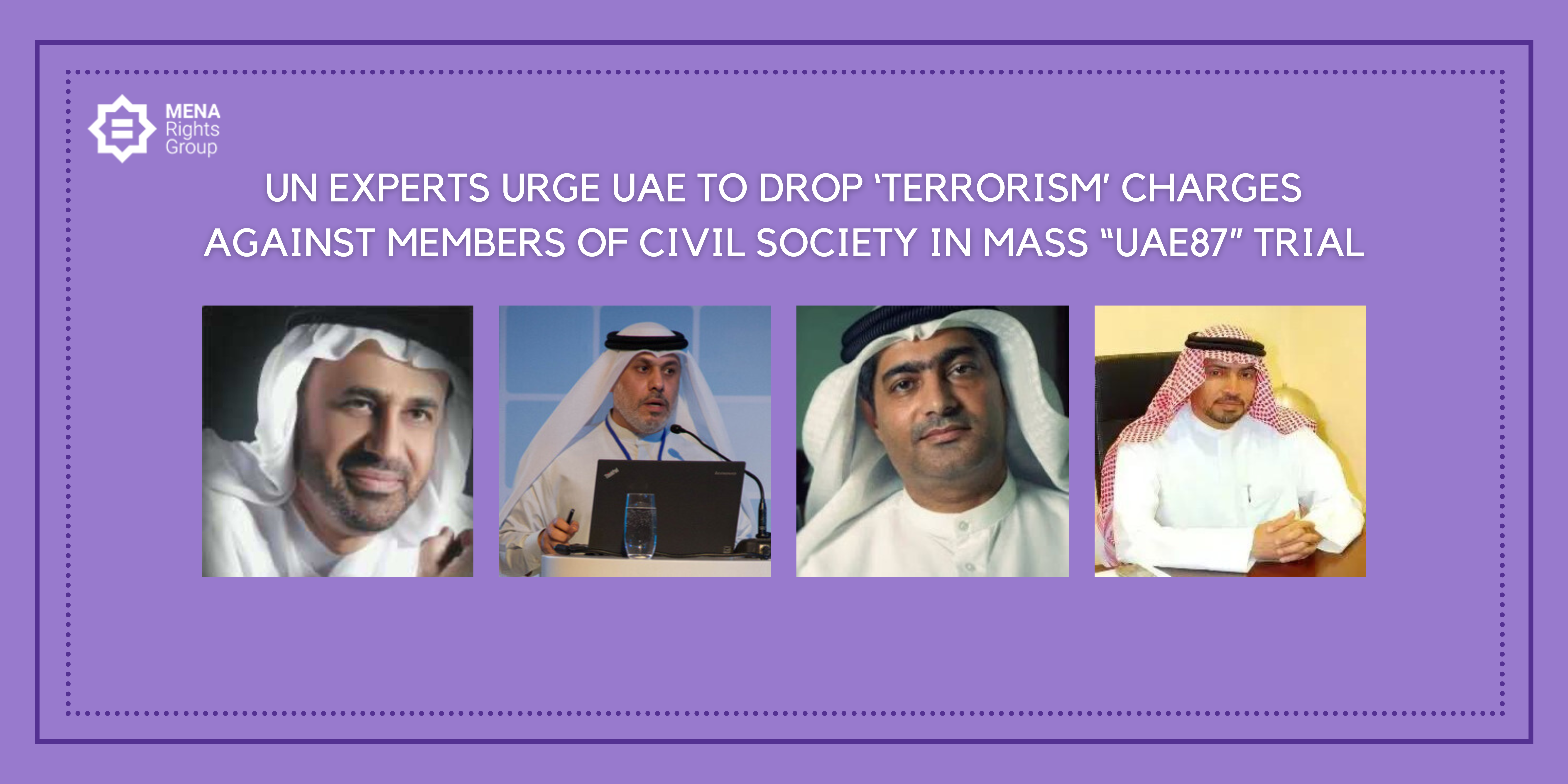January 30, 2024

From left to right: Dr. Mohammed al-Roken, Dr. Nasser Bin Ghaith (photo courtesy of Amnesty International), Ahmed Mansoor & Dr. Mohammed al-Mansori.
On December 7, 2023, the Abu Dhabi Federal Court of Appeal held its first hearing of a new mass trial involving 84 individuals, while COP28 was still underway. Most of the defendants were activists and political dissidents that were convicted following the grossly unfair “UAE94” trial of 2013, the country’s largest political mass trial to date.
In 2011, 133 lawyers, students, university professors and other figures signed a petition asking for democratic reforms in the UAE. In 2012 and 2013, a mass crackdown occurred and most of them were arrested and charged with founding, organising, and administering an organisation aimed at overthrowing the government. This campaign of mass arrests ensued in the largest trial of UAE history with 94 defendants. Most of them were sentenced to 10 years in prison and an additional corresponding travel ban.
In an Opinion issued in November 2013, the UN Working Group on Arbitrary Detention (WGAD) considered their detention to be arbitrary, as they were charged for acts that fall under their rights to freedom of expression and peaceful assembly. The WGAD therefore requested their immediate release, which the UAE did not fulfil. In fact, Emirati authorities continued to hold most of these prisoners of conscience after the completion of their sentences under the pretext of “rehabilitation”.
On December 7, 2023, authorities brought new charges against most of the “UAE94” defendants. Among them is Dr. Mohammed al-Mansori, a renowned international law jurist, and Dr. Mohammed al-Roken, a prominent Emirati human rights lawyer. In this 2023 mass trial, defendants are charged under the 2014 Emirati Counter-Terrorism Law for the establishment, endorsement, support and financing of a terrorist organisation. These offences carry severe penalties, including possible death sentences and life imprisonment.
This new mass trial also includes non-“UAE94” defendants, such as Dr. Nasser Bin Ghaith and Ahmed Mansoor, who were arrested in 2015 and 2017 respectively. Both prominent human rights defenders, were sentenced to ten years imprisonment for their peaceful activism. They are also currently being tried under the Emirati Counter-Terrorism Law.
The defendants reportedly attended the first hearing on December 7, 2023, where their names and their charges were read out. The second hearing of the trial took place on December 14, 2023, and focused on the testimonies of the witnesses of the Public Prosecution Office, which included three members of the State Security Apparatus. Some relatives of the defendants were able to attend the trial, but in a separate room where they were asked to follow the proceedings on a screen that was muted. The third hearing took place on December 21, 2023, and the fourth on January 11, 2024, during which reports of torture and ill-treatment on the accused were revealed. The fifth hearing will take place on February 7-8, 2024. Contrary to the UAE authorities’ claims, these hearings are being conducted with a lack of transparency, and no comprehensive information about the trial has been published by the UAE authorities, although the Emirates News Agency (WAM) has admitted that the UAE’s attorney general referred 84 defendants to the Abu Dhabi Federal Court of Appeal.
These charges against 84 defendants violate the principle of double incrimination, according to which a person cannot be tried twice for the same facts. This is provided under the Arab Charter on Human Rights which specifically prohibits subjecting a person to multiple trials for conduct stemming from the same or similar set of facts.
MENA Rights Group and the Emirates Detainees Advocacy Center (EDAC) jointly submitted an urgent appeal to the UN Special Rapporteur on the situation of human rights defenders and the Special Rapporteur on counter-terrorism and human rights, asking them to call upon the Emirati authorities to release all 84 defendants immediately and unconditionally.
Acting on the urgent appeal, on January 19, 2024, nine UN experts expressed their alarm at the new “spurious” terrorism charges brought against civil society in the “UAE87” trial. Importantly, they considered these charges to be a “deeply regressive step, particularly given that the UAE is currently a member of the UN Security Council’s Counter-Terrorism Committee”. They also said that some of the defendants are currently subjected to enforced disappearance and torture, and that these proceedings violate the right to a fair trial, denial or restriction of access to legal counsel, coerced confessions and lack of access to judicial proceedings.
UN experts reiterated their concern about the arbitrary application of the counter-terrorism laws and the grave violations to the right to freedom of expression it entails. They recalled that this law does not appear to “meet the required threshold of legality necessity, proportionality and non-discrimination under international law”.






